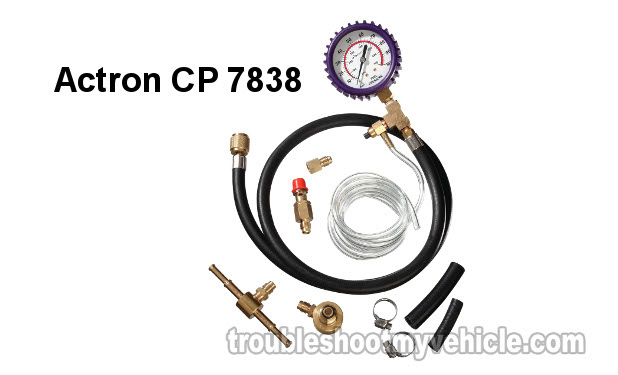STEP 2: Checking For Fuel

Lack of fuel reaching the injectors is the other major and common cause of a no-start condition and that's usually caused by a bad fuel pump.
The fuel pump usually fails in one of two ways (in the pickups and SUVs covered in this article), it either fails completely and doesn't send any fuel to the engine or it still runs, but doesn't send enough fuel to start or keep the engine running.
Keeping the two modes of failure in mind, the most accurate way of testing the fuel pump is with a fuel pressure test gauge.
- When testing the fuel pump with a fuel pressure test gauge, you'll get one of two results: correct fuel pump pressure, or low/no fuel pump pressure.
- If the pressure gauge does register the correct fuel pressure, this confirms:
- The fuel pump is getting power and Ground.
- The fuel pump fuse is good.
- The fuel pump relay is good.
- If the pressure gauge DOES NOT register the correct fuel pressure, this usually means:
- The fuel pump is bad.
Testing the fuel pump is something you can do. Depending on whether your vehicle has throttle body fuel injection or the 'Spider' fuel injection system, the following tutorial will help with this test:
- Troubleshooting the fuel pump (GM 4.3L, 5.0L, 5.7L) (for 'Spider' fuel system equipped vehicles).
- How To Test The Fuel Pump On GM TBI Fuel Systems (for throttle body fuel injection fuel system equipped vehicles).
STEP 3: Checking The PassLock Anti-Theft System For Problems
A failure in one of the Passlock system's components will cause the engine to start and then stall after a few seconds.
This is due to the fact that the PCM, in your GM pickup or SUV, has disabled the fuel injectors.
Unfortunately a Passlock failure mimics a failed fuel pump problem and usually makes the vehicle owner think that the fuel pump has failed.
Here are the basics of what you should do to find out if the Passlock system is the one keeping your pickup or SUV from starting:
- Check fuel pressure with a fuel pressure test gauge.
- If fuel pressure is at specification, the next step is to check for spark.
- If fuel pressure is NOT at specification, then the Passlock system is not the cause of the no-start condition.
- Check for spark with a spark tester.
- If spark is present at all 8 cylinders, the next step is to see if the engine starts with starting fluid.
- If spark is NOT present at all 8 cylinders, then the Passlock system is not the cause of the no-start condition.
- Start the engine with starting fluid.
- If the engine starts (even though it'll stall after the starting fluid you sprayed into the throttle body gets consumed), then you have confirmed that the Passlock system is keeping the engine from staying running.
The Passlock system leaves specific trouble codes in the PCM's memory when a failure occurs in one of its components. Unfortunately, you need a professional level scan tool (the ones that cost US$ 2,000 +) to read these codes.
This doesn't mean you can't correctly pinpoint the Passlock system as the culprit behind your pickup or SUV's no-start condition. For more info on this, check out the Passlock symptom chart in this tutorial:
STEP 4: Checking Engine Mechanical Condition
One of the most overlooked areas, when testing a hard to diagnose no-start, is the mechanical condition of your 4.3L, 5.0L, 5.7L GM pick up, van or SUV.
Checking the engine mechanical condition means an engine compression test.
- When performing an engine compression test, what you're looking for is an average compression reading of less than 90 PSI across all or the majority of the engine cylinders.
- If you have one or just two readings that are under 90 PSI your GM vehicle will still start and run, albeit with a misfire condition.
- I've written a 'How To Do A Compression Test' tutorial that you may find useful. You can find it here: 4.3L, 5.0L, 5.7L Engine Compression Test.
No Start Summary
So many different things can cause a no-start condition that troubleshooting it can turn your GM vehicle into a money pit, if you don't have a basic diagnostic strategy. The key to saving yourself time and money is checking for the basics first. The basics are spark and fuel.
To check the basics, you need tools. There's just no way around it. One of the analogies that I've always enjoyed repeating, about doing a job without the right tools is like trying to eat a bowl of soup with a fork.
So besides knowing what to test, you need tools to do those tests. You don't have to spend an arm and a leg, since you can buy a lot of diagnostics tools that are tailored for the pocket-books of the serious do-it-yourself-er. Here are some of the basic tools you'll need:
- Fuel pressure gauge.
- Spark tester.
- Compression gauge.
- Multimeter.
Related Test Articles
You can find a complete list of tutorials here: GM 4.3L, 5.0L, 5.7 Index Of Articles. Below, is a sample of articles you'll find in this index of articles:
- How To Test The Engine Compression (GM 4.3L, 5.0L, 5.7L).
- How To Test The Crank Sensor (GM 4.3L, 5.0L, 5.7L).
- How To Test A Misfire / No Spark-No Start Condition (4.3L, 5.0L, 5.7L 96-04) (at: easyautodiagnostics.com).
- How Can I Tell If My 4L60-E Transmission Is Bad?
- Troubleshooting A Blown Head Gasket (GM 4.3L, 5.0L, 5.7L).
- Shift Solenoid A And B Tests (GM 4.3L, 5.0L, 5.7L).

If this info saved the day, buy me a beer!

